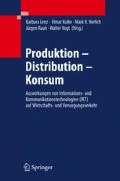Zusammenfassung
Der immer intensivere Einsatz von modernen elektronischen Informations- und Kommunikationstechnologien und die fortschreitende räumliche wirtschaftliche Arbeitsteilung stehen in unmittelbarem Zusammenhang miteinander. So bilden moderne Kommunikationsmethoden sowohl eine wichtige Voraussetzung für die Intensivierung supraregionaler und internationaler Verflechtungen von Warenhandel und Direktinvestitionen als auch ein entscheidendes Element zur Neuorganisation der räumlichen Beziehungen der Wirtschaft.
Access this chapter
Tax calculation will be finalised at checkout
Purchases are for personal use only
Literatur
Gereffi G (1996): Global commodity chains: new forms of coordination and control among nations and firms in international industries. In: Competition & Change 4, S. 427–439.
Henschel S (2004): Potentielle Standortwirkungen von Innovationen der Informations- und Kommunikationstechnologien im Lebensmitteleinzelhandel. Berliner Geographische Arbeiten 99, Berlin.
Hesse M, Nuhn H (2006): Verkehrsgeographie. Paderborn/München/Wien/Zürich.
Kulke E (2004): Wirtschaftsgeographie. Paderborn/München/Wien/Zürich.
Kulke E (2005a): Weltwirtschaftliche Integration und räumliche Entwicklung. In: Geographische Rundschau 57(2), S. 4–10.
Kulke E (2005b): Globaler Warenhandel. In: Praxis Geographie 35(7–8), S. 4–9.
Lenz B (1997): Das Filiere-Konzept als Analyseinstrument der organisatorischen und räumlichen Anordnung von Produktions- und Distributionsprozessen. In: Geographische Zeitschrift 85(1), S. 20–33.
Neiberger C, Bertram H (2005): Waren um die Welt bewegen. Studien zur Mobilitäts- und Verkehrsforschung, Band 11, Mannheim.
Nuhn H (2004): Coffee boom and coffee crisis – open markets, global competition and consequences for developing countries. In: Die Erde 135(1), S. 1–30.
Ostertag M (2000): Globalisierung unter Aspekten der Wirtschaftsgeographie. Nürnberger Wirtschafts- und Sozialgeographische Arbeiten 55, Nürnberg.
Schamp E W (2000): Vernetzte Produktion. Darmstadt.
Author information
Authors and Affiliations
Corresponding author
Editor information
Editors and Affiliations
Rights and permissions
Copyright information
© 2009 Springer-Verlag Berlin Heidelberg
About this chapter
Cite this chapter
Kulke, E. (2009). Informations- und Kommunikationstechnologien in Warenketten und ihre Auswirkungen auf den Verkehr – Zusammenfassung. In: Lenz, B., Kulke, E., Nerlich, M., Rauh, J., Vogt, W. (eds) Produktion - Distribution - Konsum. Springer, Berlin, Heidelberg. https://doi.org/10.1007/978-3-540-87807-0_7
Download citation
DOI: https://doi.org/10.1007/978-3-540-87807-0_7
Published:
Publisher Name: Springer, Berlin, Heidelberg
Print ISBN: 978-3-540-87806-3
Online ISBN: 978-3-540-87807-0
eBook Packages: Computer Science and Engineering (German Language)

